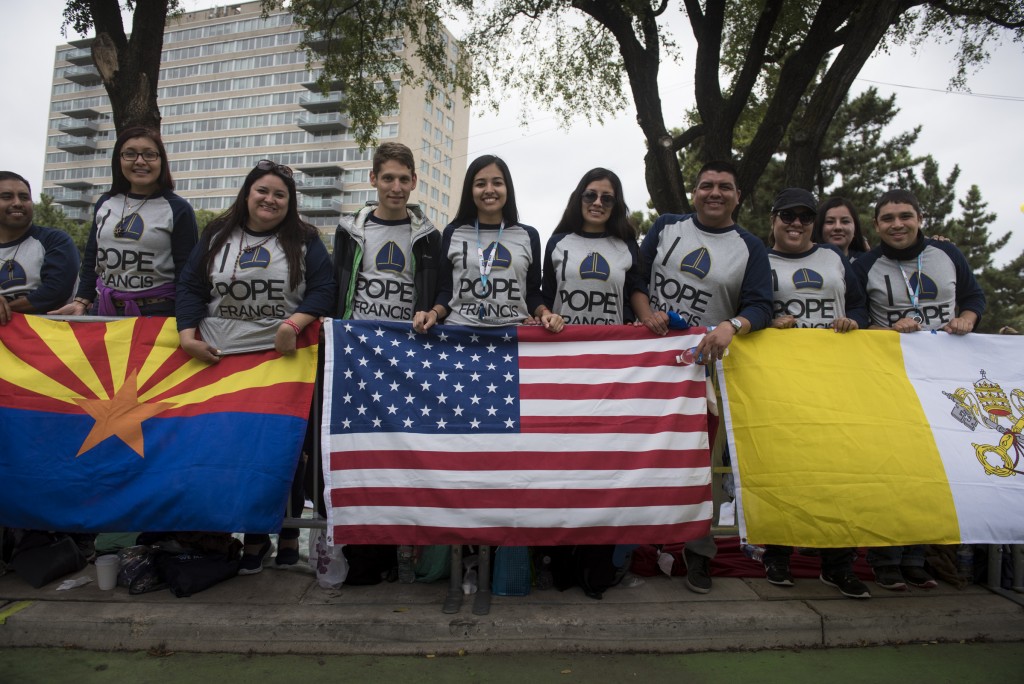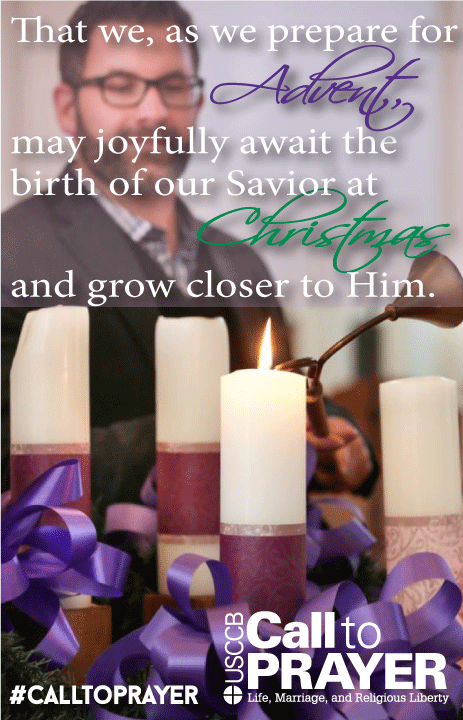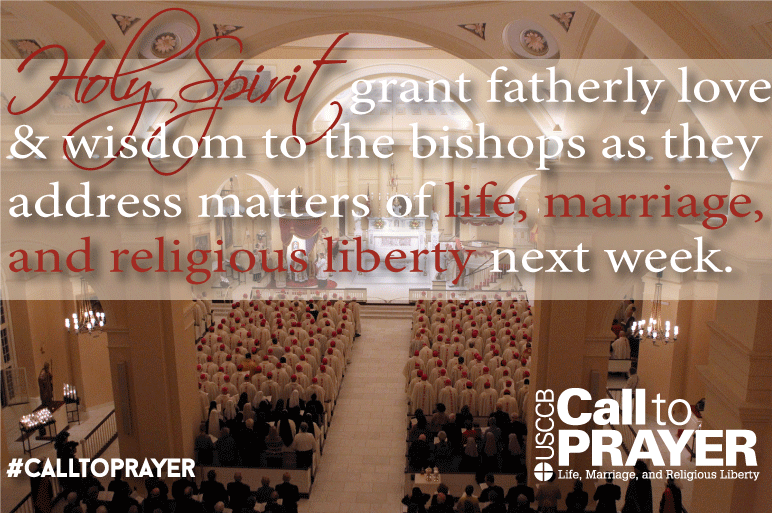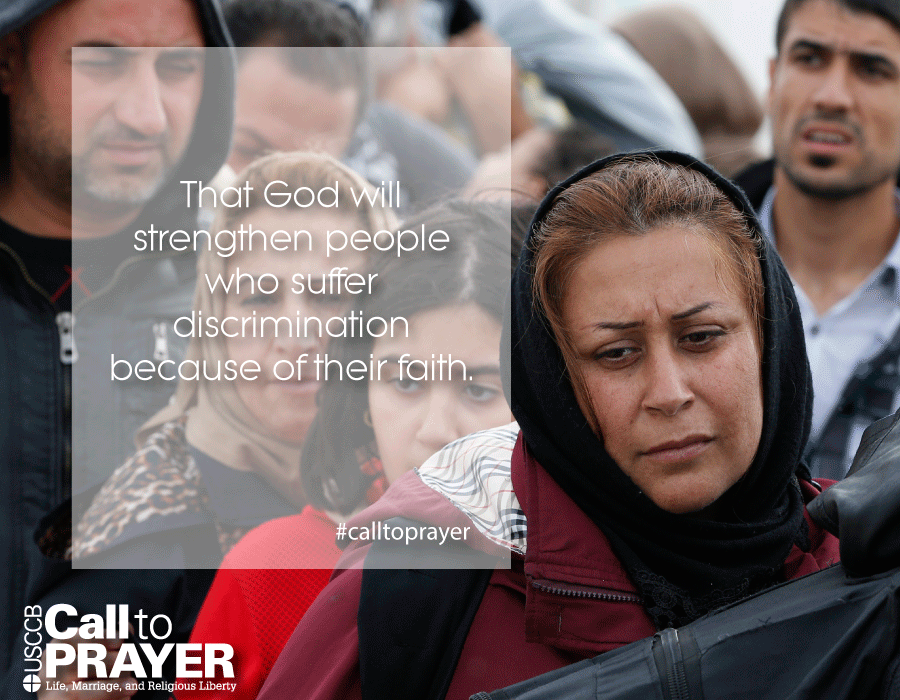Call to Prayer: November 27, 2015
Archive
Call to Prayer: November 20, 2015
Archive
Create in Me a Clean Heart
 The U.S. Bishops overwhelmingly approved a pastoral response to pornography entitled “Create in Me a Clean Heart” at their general assembly on November 17. The full text is available on the USCCB page, as well as many additional resources.
The U.S. Bishops overwhelmingly approved a pastoral response to pornography entitled “Create in Me a Clean Heart” at their general assembly on November 17. The full text is available on the USCCB page, as well as many additional resources.
Archive
Call to Prayer: November 13, 2015
Archive
The Prophecy of the Covenant of Man and Woman: Pope Francis
 (Picture taken of plush Francis in front of the Basilica of the National Shrine of the Immaculate Conception in Washington, D.C.)
(Picture taken of plush Francis in front of the Basilica of the National Shrine of the Immaculate Conception in Washington, D.C.)
Pope Francis’s trip to the United States in September centered on his appearance at the World Meeting of Families in Philadelphia. We finish with another quote from the closing homily at the Mass for the World Meeting of Families:
“We renew our faith in the word of the Lord which invites faithful families to this openness [to the gospel]. It invites all those who want to share the prophecy of the covenant of man and woman, which generates life and reveals God!”
Christians are people of hope! God will never abandon his people, his chosen family, regardless of how far we fall away from him. As we approach the Jubilee of Mercy, this will be a theme for the entire Church to reflect and meditate upon. Our God is more than simply “willing” to forgive us; He longs to do so. He longs for us to return home, contrite and aware of our brokenness, and He is ready to run out to us and clothe us again as his children.
This is what it means to be faithful: not to never fall, but to keep getting up, coming back to the Lord, converting our hearts every day in order to conform our lives to the word of God. To become a saint, whose life only makes sense in light of the gospel of Jesus.
A faithful family is not a “perfect” one in the eyes of the world, but one that is open to the word of God, and open to one another even in the wounds each person bears. It is one that struggles and goes through trials, is tested and sometimes fails, but returns again to the struggle.
For example, one could think about a “perfect” family as one in which the parents never yell at the children, and the children are always delighted to go to bed at the proper time, because they are obedient and trust their parents’ judgment. Has anyone ever met such a family? No. But have you ever seen a family where, after a long and arduous struggle on the part of the parents to get the children into bed (and stay there), where there may be some sharp words and exasperation, there is reading of a story, and a moment of prayer? A kiss and an “I love you” and a “tucking in” of the children?
Cardinal Tagle of Manila spoke of the family as the “Home for the Wounded Heart” at the World Meeting of Families and remarked on the way that family members, because they sin, hurt each other, but they also forgive and heal each other as well. They are a home for each other, where they know that no matter what, they will be loved and accepted, even if not understood or agreed with.
When he referred to prophesying in this quote, Pope Francis was reflecting on the passage of the Old Testament in which Moses wishes that all people may be prophets. The Holy Father likewise invited all of us to be open to the Gospel of the Family, and in doing so, to become prophets. The covenant between man and woman, which gives life and is an image of the Trinity, is a prophecy for our time. It is a message for the world: life is good and love is real. The word of God is still speaking to the hearts of men and women today, and affirming their desires for a permanent and fruitful love.
Archive
Call to Prayer: November 5, 2015
Archive
Faith Opens a Window: Pope Francis
 Photo Credit: Jeffrey Bruno
Photo Credit: Jeffrey Bruno
Pope Francis’s trip to the United States in September centered on his appearance at the World Meeting of Families in Philadelphia. The sixth quote in our series comes from Pope Francis’s homily for the conclusion of the World Meeting of Families on September 27:
“Faith opens a ‘window’ to the presence and working of the Spirit. It shows us that, like happiness, holiness is always tied to little gestures… Love is shown by little things.”
St. Therese of Lisieux is the patroness of world missions, despite being a cloistered Carmelite, who never left the convent. She shares this honor with St. Francis Xavier, who spent his life as a missionary and baptized countless people throughout Asia. On the surface, this seems to be a contradiction. St. Francis Xavier was the perfect picture of a missionary: bold and brave, traveling to foreign lands, living among the people. St. Therese was a plain French girl, who was so eager to enter the convent that she begged the pope to let her go there at the age of 15. She only lived until the age of 24, dying of tuberculosis. Why does she share the honor of patron of world missions? Why did missionary bishops ask for this?
In the short biography of St. Therese on the Vatican site, we can read why: “She considered it a special gift to receive the charge of accompanying two ‘missionary brothers’ with prayer and sacrifice. Seized by the love of Christ, her only Spouse, she penetrated ever more deeply into the mystery of the Church and became increasingly aware of her apostolic and missionary vocation to draw everyone in her path.” St. Therese was in the “mission field” through contemplative prayer and correspondence with missionaries.
This teaches us something about what holiness, and what being a missionary, really means. In her daily mortifications and sacrifices, young Therese offered to God her whole heart, mind, spirit and body. She had a great desire to be a missionary, even a martyr, but knew that that was not God’s will for her. Instead, she offered her myriad little, unnoticed actions for missionaries around the world. She demonstrated love in the “little things,” just as the pope spoke about at the world meeting.
Alice von Hildebrand wrote a personal story about this in a letter to a newlywed woman who was not sure that the “little things” really mattered in marriage. Von Hildebrand strongly disagreed. She wrote,
“Early in our marriage, I noticed he [Dietrich] would always leave the soap swimming in a small pool of water. It would slow degenerate into an unattractive, slimy goo—something I found unappealing. I drew it to his attention. From that day on, he made a point of drying the soap after each use—to such an extent that I couldn’t tell from the ‘soap testimony’ whether he had washed himself or not… I was so moved by this, that to this day I feel a wave of loving gratitude for this small but significant gesture of love.
My husband was a great lover. And because he was one, he managed to relate the smallest things to love and was willing to change to please his beloved in all legitimate things. This characteristic is typical of great love” (By Love Refined).
Family life is rife with opportunities to show love in little ways, and to find the Holy Spirit working there—if we look with the eyes of faith.
Let us all seek to be great lovers of God!
Archive
Bishops of Northern Ireland
The bishops of Northern Ireland wrote an open letter to members of the legislative assembly regarding the proposal of same-sex “marriage”
—————————————————————-
Dear Member of the Legislative Assembly,
Today, Monday 2 November, members of the Northern Ireland Assembly will debate a motion calling on the Northern Ireland Executive ‘to table legislation to allow for same-sex marriage’.
As pastors and teachers we have a responsibility to offer guidance to members of the Church and to participate with other citizens in debating the values and laws that ensure the authentic common good of society.
In public debate about the nature of marriage and the family it can sometimes be lost that the Church’s first words to all who experience homosexual attraction are those of love, understanding and a desire to journey supportively with all who follow Jesus with a sincere heart. The Church teaches that every person must be welcomed with respect for their dignity and with care to avoid “any form of unjust discrimination”(Congregation for the Doctrine of the Faith, Considerations Regarding Proposals to Give Legal Recognition to Unions Between Homosexual Persons, 2003, n.4).
In the context of the forthcoming Assembly debate, we wish to express our particular concern that the motion presented provides no detail whatsoever of the scale or scope of the legislation being proposed. It is also completely silent on the vital issue of respect for individual religious conscience and protections for Churches and other religious groups. Those who vote in favour of this motion have no way of knowing what the full consequences of such a vote will be. What will be the impact for services provided by Churches and other faith groups that offer vital support to marriages and families in all kinds of distress and thereby contribute to the well-being of children and society? The failure of legislators to provide any form of protection for Catholic Church-related adoption agencies that have had to close in recent years is a stark warning to all who value the wide range of social and pastoral services that Churches provide. The motion being debated in the Assembly fails completely to protect the future of these services and their right to operate within the religious ethos from which they were founded and continue to provide a valued service to communities.
We ask you especially as a legislator to keep the rights and welfare of children to the forefront of your considerations when voting on the forthcoming motion. Religious and non-religious people alike have long acknowledged and know from their experience that the family, based on the marriage of a woman and a man, is the best and ideal place for children. The proposed motion before the Assembly effectively says to parents, children and society that the State should not, and will not, promote any normative or ideal family environment for raising children. It therefore implies that the biological bond and natural ties between a child and its mother and father have no intrinsic value for the child or for society. As Pope Francis stated recently, “we must reaffirm the right of children to grow up in a family with a father and a mother capable of creating a suitable environment for the child’s development and emotional maturity” (16 April 2014). We also reiterate the objective truth, affirmed by the recent Synod on the Family, that “there is no foundation whatsoever to… establish an even remotely analogous correspondence between homosexual unions and God’s plan for marriage and the family“ (Synod 2015, Relatio Finalis, n.76).
The truth about marriage derives from its intrinsic nature as a relationship based on the complementarity of a man and woman and the unique capacity of this relationship alone to generate new life. This truth does not change with the shifting tides of historical custom or popular opinion.
Finally, we appeal to members of the Northern Ireland Executive and Assembly to give urgent priority to the many other issues that impact on children, marriage and the family in our society, including the continued failure to lift the distressing levels of child poverty in Northern Ireland, which are among the highest in Western Europe, and the immense stress being caused to many individuals, families and marriages because of proposed welfare cuts and the long term social disadvantage to which so many in Northern Ireland continue to be subjected.
With respect and encouragement for your important work as a public representative.
Yours faithfully,
+Eamon Martin
Archbishop of Armagh
+Anthony Farquhar
Auxiliary Bishop of Down and Connor
+John McAreavey
Bishop of Dromore
+Liam MacDaid
Bishop of Clogher
+Donal McKeown
Bishop of Derry
+Noël Treanor
Bishop of Down and Connor
Archive
A Culture of the Temporary: Pope Francis
 Photo credit: Jeffrey Bruno
Photo credit: Jeffrey Bruno
Pope Francis at the World Meeting of Families: Seven Great Quotes
Pope Francis’s trip to the United States in September centered on his appearance at the World Meeting of Families in Philadelphia. Here is the fifth quote, from the meeting with bishops on September 26:
“Today’s culture seems to encourage people not to bond with anything or anyone, not to trust.”
As noted last week, fidelity as a virtue is no longer upheld in the culture. This is one contributing factor to the phenomenon that Pope Francis points to in today’s quote: young people are marrying at a far lower rate now than in the past. The capacity to bond with another person, to commit to them, and to entrust yourself to them, seem to be diminishing. The culture does not encourage qualities like trust, listening, patience, vulnerability, or commitment, all of which are necessary for marriage.
The fact of widespread divorce has resulted in many adult children who do not have personal experience or support of parents who have remained faithful to their spouses. They are understandably more anxious about making a lifetime commitment, because they fear that they, too, will “fail”.
Even if their parents are married, many young people buy into the lie that they need to “try the other person out” sexually before they make a commitment. Ironically, engaging in premarital sex with multiple partners actually diminishes the physical and chemical bond that forms through the sexual act, thus diminishing the likelihood of commitment rather than increasing it. This attitude toward sex plays directly into what Pope Francis calls the “throwaway culture.” Instead of seeing another person as a gift, a person who should be loved and never used, a man or woman sees the other as a possibility for “fun” or “release” without regard to their dignity or to the future.
Young adults often turn to cohabitation as a way of “easing in” to a commitment, which turns out to be counter-productive, as these relationships are less stable by design. Accustomed to living together without marriage, these couples also appear less likely to stay married when trouble comes. Researcher Brad Wilcox concludes that living in a cohabitating household is now the largest problem for children in America.
Social media and other forms of technology also seem to feed into a culture where there are no strong bonds between people. As MIT researcher Sherry Turkle notes, “Once we remove ourselves from the flow of physical, messy, untidy life — and both robotics and networked life do that — we become less willing to get out there and take a chance” (Alone Together). Connections through technological means are more frequent but less deep, and almost never require sacrifice. It is no wonder, then, that young people have a harder time choosing to commit to one person for the rest of their life, when they have not practiced faithful, sacrificial friendship.
Marriage, then, is like a revolt against the culture of the temporary. As Pope Francis said at World Youth Day in 2013: “I ask you, instead, to be revolutionaries, to swim against the tide; yes, I am asking you to rebel against this culture that sees everything as temporary and that ultimately believes that you are incapable of responsibility, that you are incapable of true love.”



